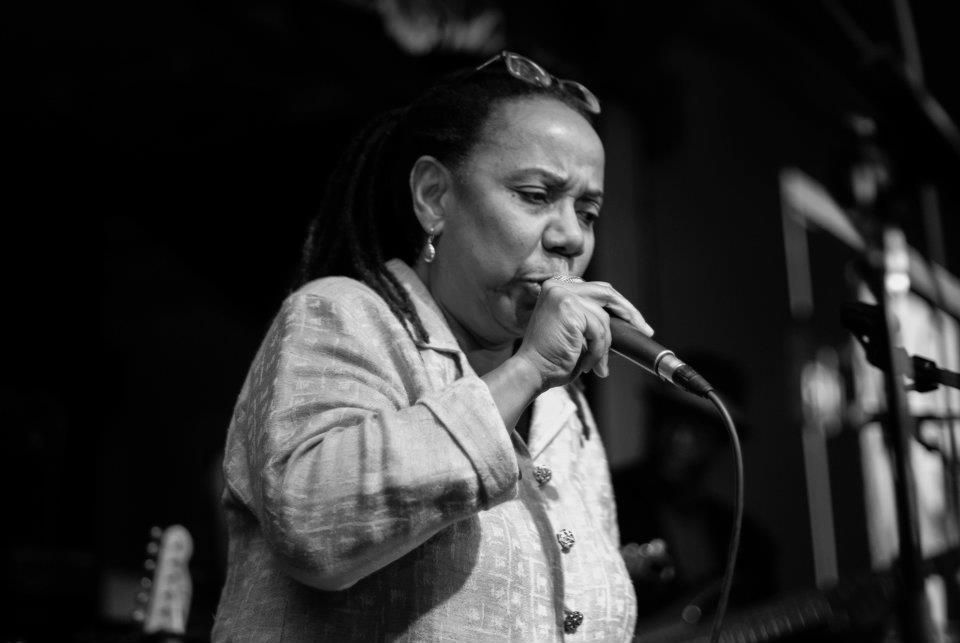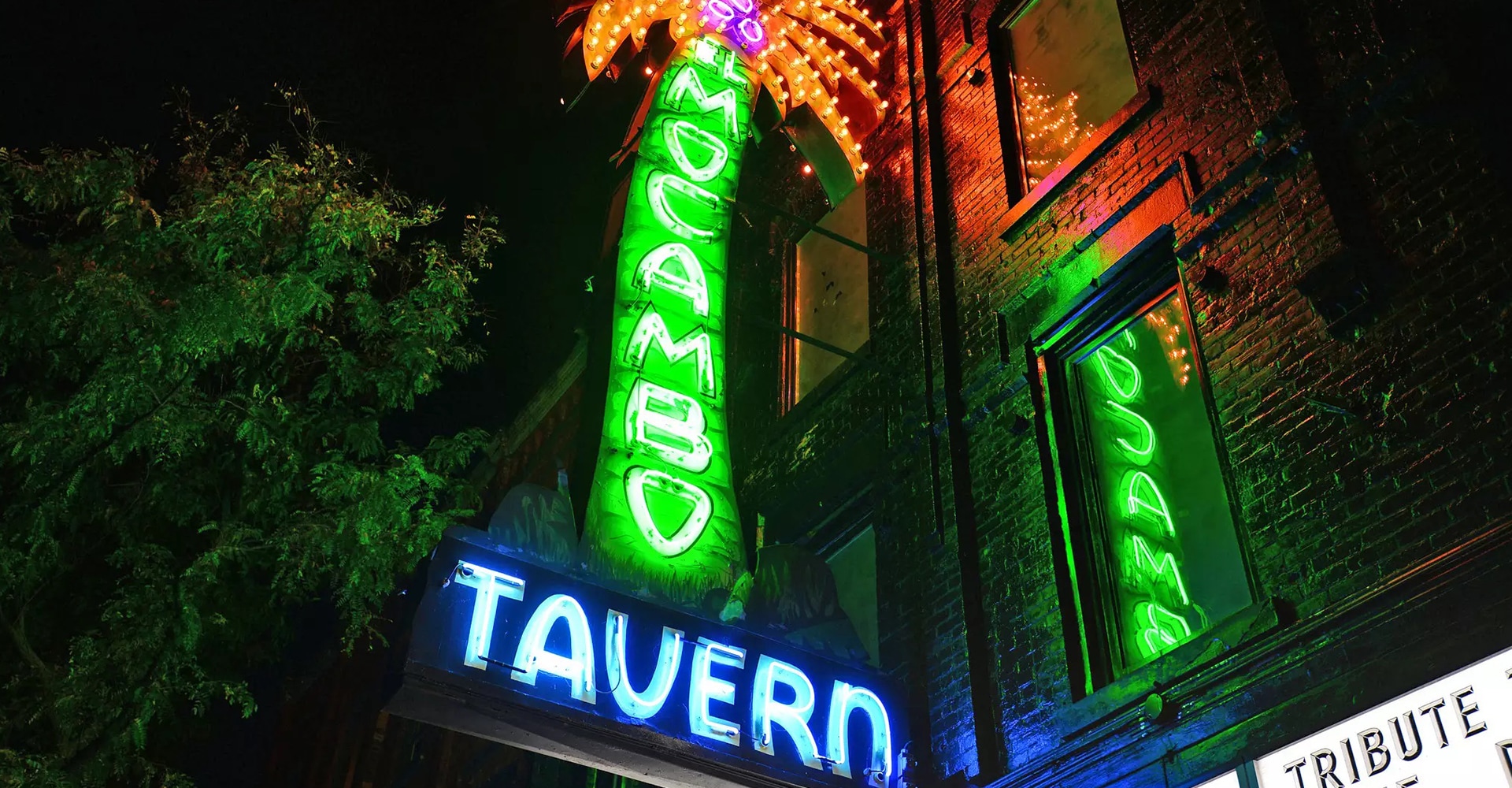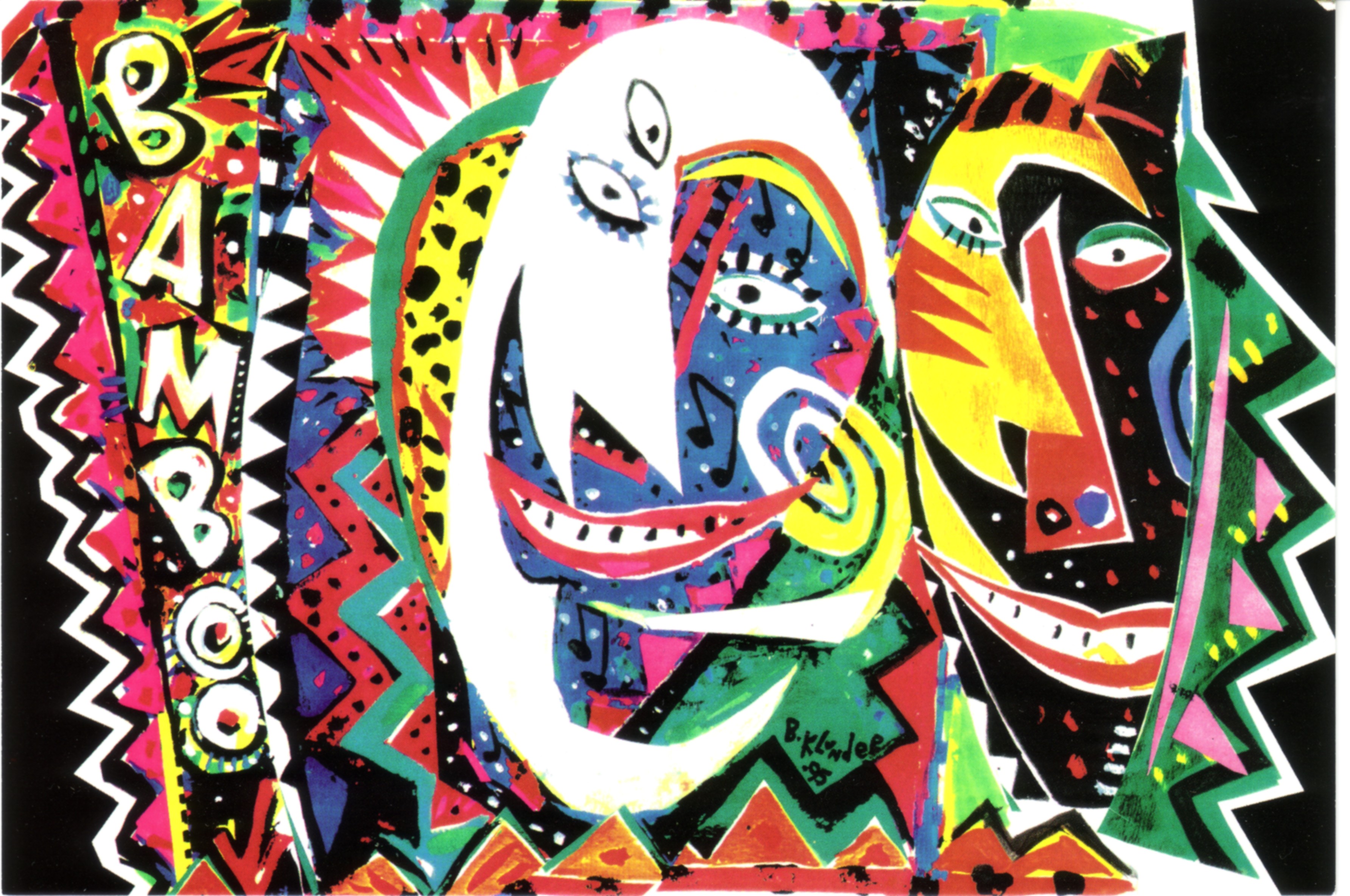
Power to the people, rise up!
Lorraine Segato has been involved with community activism, social justice, and cultural equity thanks to her involvement with lesbian radical rock band Mama Quilla II, the politically active band V, and finally the Parachute Club.
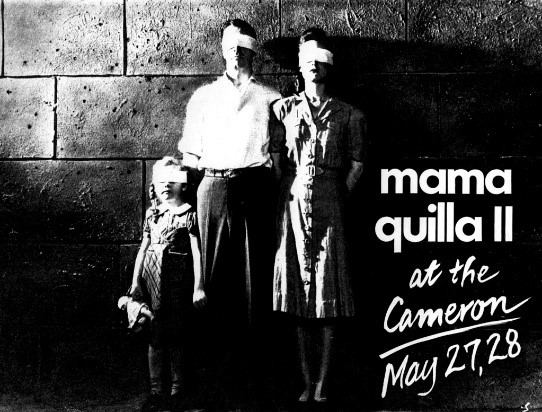
Poster for a Mama Quilla II performance at Toronto's Cameron House (year unknown)
Courtesy of Lorraine Segato
Mama Quilla II
During the late 1970s and early 1980s, Lorraine Segato was the vocalist for the radical feminist band, Mama Quilla II. The band performed at rallies and benefit concerts addressing issues such as censorship, disarmament, the Cold War, Indigenous land rights, and pro-choice abortion rights. The band also played established Toronto venues such as the El Mocambo, the Cameron House, and the Horseshoe Tavern.
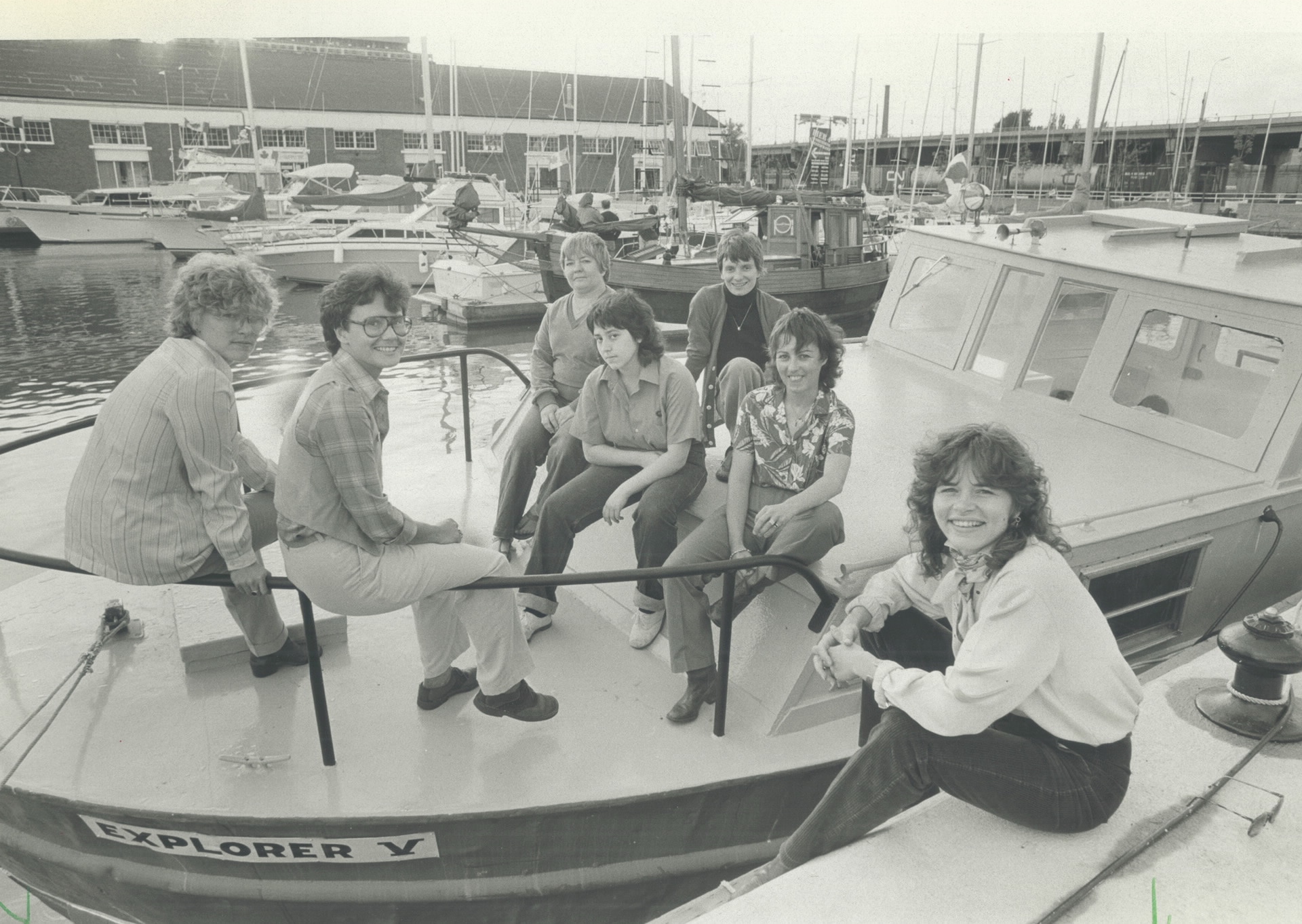
Members of Mama Quilla II along the Harbourfront, 1980. Members included (left to right) B.J. Danylchuk, Linda Jain, Maxine Walsh, Susan Sturman, Jaqi Snedker, Linda Robitaille, and Lorraine Segato sitting on the dock.
Photo by Doug Griffin, courtesy of the Toronto Star Archives
While performing with Mama Quilla II, Lorraine Segato and the band's drummer, Billy Bryans (1948-2012), also formed other musical groups, such as the band V.
Working with Mojah, a Trinidadian-born singer-guitarist who also performed with prominent Toronto reggae band Truth & Rights, V gave Bryans and Segato a space to explore new rhythms. V's songs also heavily featured messages geared towards social change.
During the 1980s, the genre of what was known as world music, often categorized by record labels as non-Western traditional and pop music, was exploding out of Toronto. The neighbourhood of Queen Street West was filled with experimental artists, performances, rebellion, and new sounds.
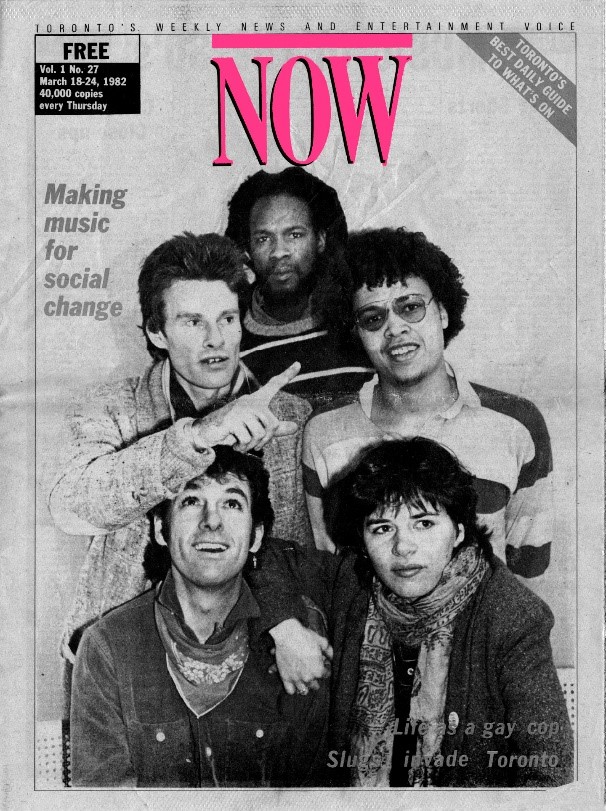
Members of the band V on the cover of NOW Magazine, Vol. 1, No. 27, March 18-24 1982: (clockwise from top) Mojah, Jeffrey Holdip, Lorraine Segato, Terry Wilkins and Billy Bryans.
Courtesy of Lorraine Segato and NOW Magazine
A Festival Big Break
Performing locally for Toronto's bar and nightclub scene, a chance at national fame for Segato and Bryans came unexpectedly in 1982.
Organizers of the Toronto Festival of Festivals, known today as the Toronto International Film Festival (TIFF), approached Bryans about an opportunity to perform as part of the festival's live entertainment.
With many members of Mama Quilla II or V unavailable for the gig, Bryant and Segato debuted a new group called the Parachute Club.
Featuring a fusion sound, the group included Segato as lead singer and guitarist, Laurie Conger on keyboards and vocals, percussion by Julie Masi, and Margo Davidson on saxophone. Billy Bryans played drums, with Steve Webster on bass and Dave Gray on guitar.
It may have been a one-night-only gig, but it was all the group needed. Current Records approached Segato and Bryans soon after their performance, signing them to their label. The Parachute Club was officially a band with a recording contract.
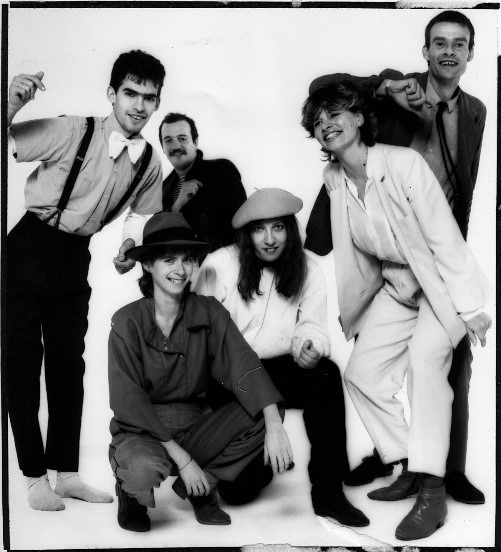
Courtesy of Lorraine Segato
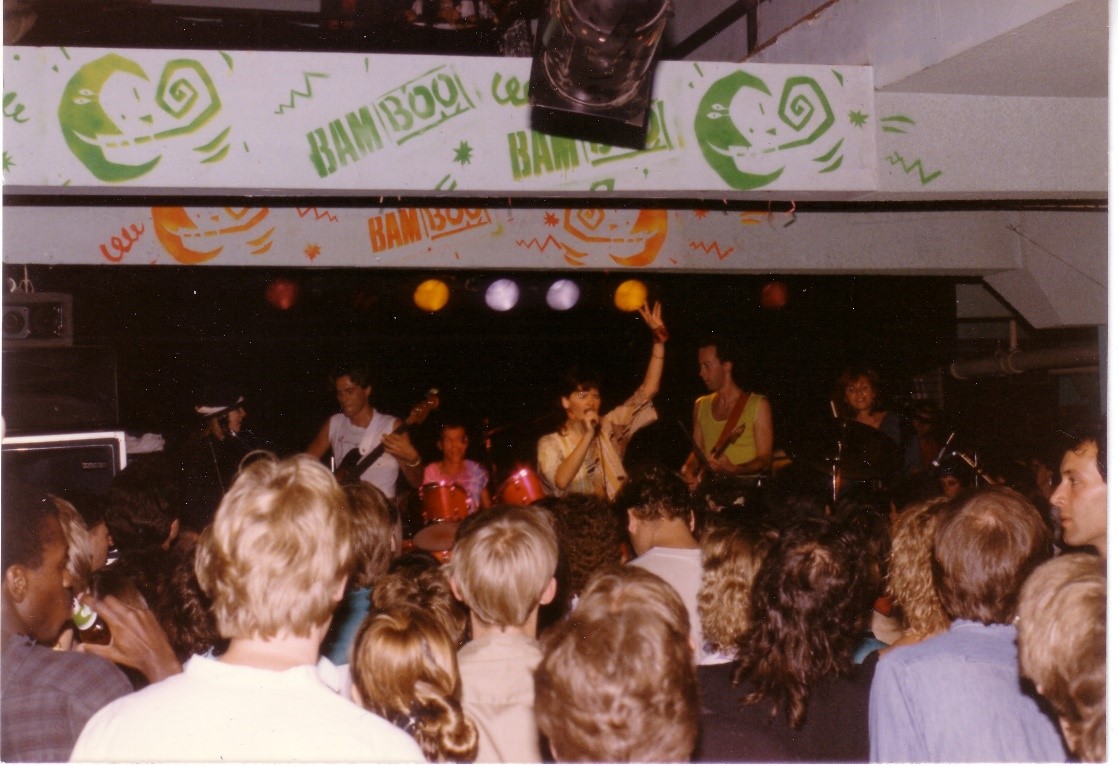
Parachute Club performing at the BamBoo on July 11, 1983 as part of the release of their debut album.
Courtesy of Patti Habib
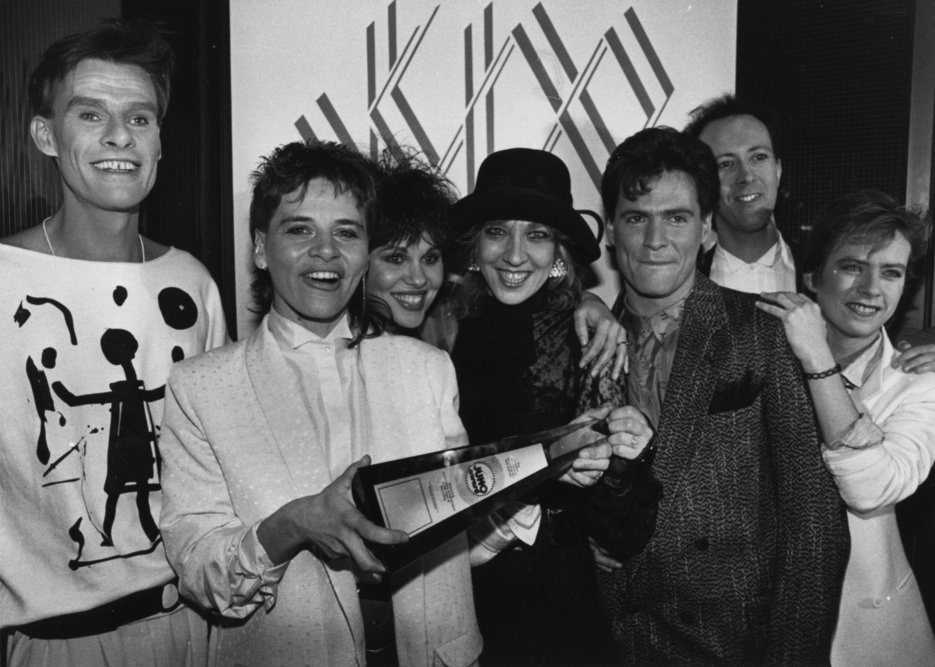
Parachute Club received the 1984 JUNO Awards for Single of the Year and Most Promising Group. Courtesy of Canadian Press/CP
An Instant Hit
Parachute Club released their self-titled debut album at the yet-to-be-opened BamBoo in the Queet Street West neighbourhood on July 11, 1983.
The Parachute Club’s 1983 debut album featured the hit "Rise Up", an instant hit that transformed the lives of the band. Within a few months, the Parachute Club went from playing small bars and audiences with about 30 people to arena venues with over 10,000 people in the audience. The song went on to win the 1984 JUNO Award for Single of the Year.
Watch: Rise Up
Released in 1983, the hit single "Rise Up" was co-written by Billy Bryans, Lauri Conger, Lorraine Segato, as well as Canadian filmmaker Lynne Fernie. The band did not write the song with a specific community or cause in mind, hoping the song could stand an enduring call for freedom and equality.
The band first performed the song live at the conclusion of the 1983 Toronto Pride Parade. Singing "Rise Up" on a small stage at the center of King's College Circle (the location of the parade at the time), the reaction to the song was immediate. Hundreds of parade attendees rushed the stage in celebration of the song's message of equality.
The music video for “Rise Up” showcases the band rolling down King Street West. The recently built Roy Thomson Hall in downtown Toronto features prominently in the background.
This online exhibition uses third-party applications including Spotify and YouTube. Check with your organization’s web administrator if you are unable to access content from these channels in the exhibition.

Courtesy of Parachute Club and SME. Please note: this third-party video does not provide closed captions.
View Transcript♪Rise up, rise up
Oh, rise and share your power
Rise up, rise up
We're dancing to the sun
Rise up, rise up
In clear-eyed celebration
Rise up, rise up
The spirit's time has come
We want loving, want laughter again
We want heartbeat, want madness to end
We want dancing, want to run in the streets
We want freedom to live in its peace
We want power, want to make it okay
Want to be singing at the end of the day
Children to breathe a new light
We want freedom to love who we please
Rise up, rise up
Oh, rise and share your power
Rise up, rise up
Everybody's dancing to the sun
Rise up, rise up
It's time for celebration
Rise up, rise up
The spirit's time has come
Talking 'bout the right time to be working for peace
Wanting all the tensions in the world to ease
We want to love, run wild in the streets
We want to be free, we want to be free
Talking about a new way, talking about changing our names
Talking about building a land of our dreams
This tightrope's got to learn how to bend
Makin' new plans, we're gonna start it again
Rise up, rise up
Oh, rise and share your power
Rise up, rise up
Everybody's dancing to the sun
Rise up, rise up
In clear-eyed celebration
Rise up, rise up
The spirit's time has come
Rise up now
It's time, it's time, it's time
Rise up, rise up
Oh, rise and share your power
Rise up, rise up
We're dancing to the sun
Rise up, rise up
It's time for celebration
Rise up, rise up
Everybody's time has come
Spirit's time has come
Spirit's time has come
Rise up, rise up
Oh, rise and share your power
Rise up, rise up
Oh, dancing to the sun
Rise up, rise up
It's time for celebration
Rise up, rise up
The spirit's time has come
Woman's time has come
Spirit's time has come♪
Segato's Telecaster Guitar
In the 1983 Canadian music video for "Rise Up", you can see Lorraine Segato playing a Telecaster guitar.
The sound of the telecaster is very specific. It has a twang to it and sounds great when you muted the strings and because I was playing a lot of rhythm guitar for groove and funky music is adapted well to the songs we were writing.
—Lorraine Segato
Segato played this 1982 Fender Telecaster electric guitar for over 35 years during her performances with Mama Quilla II, V, and Parachute Club.
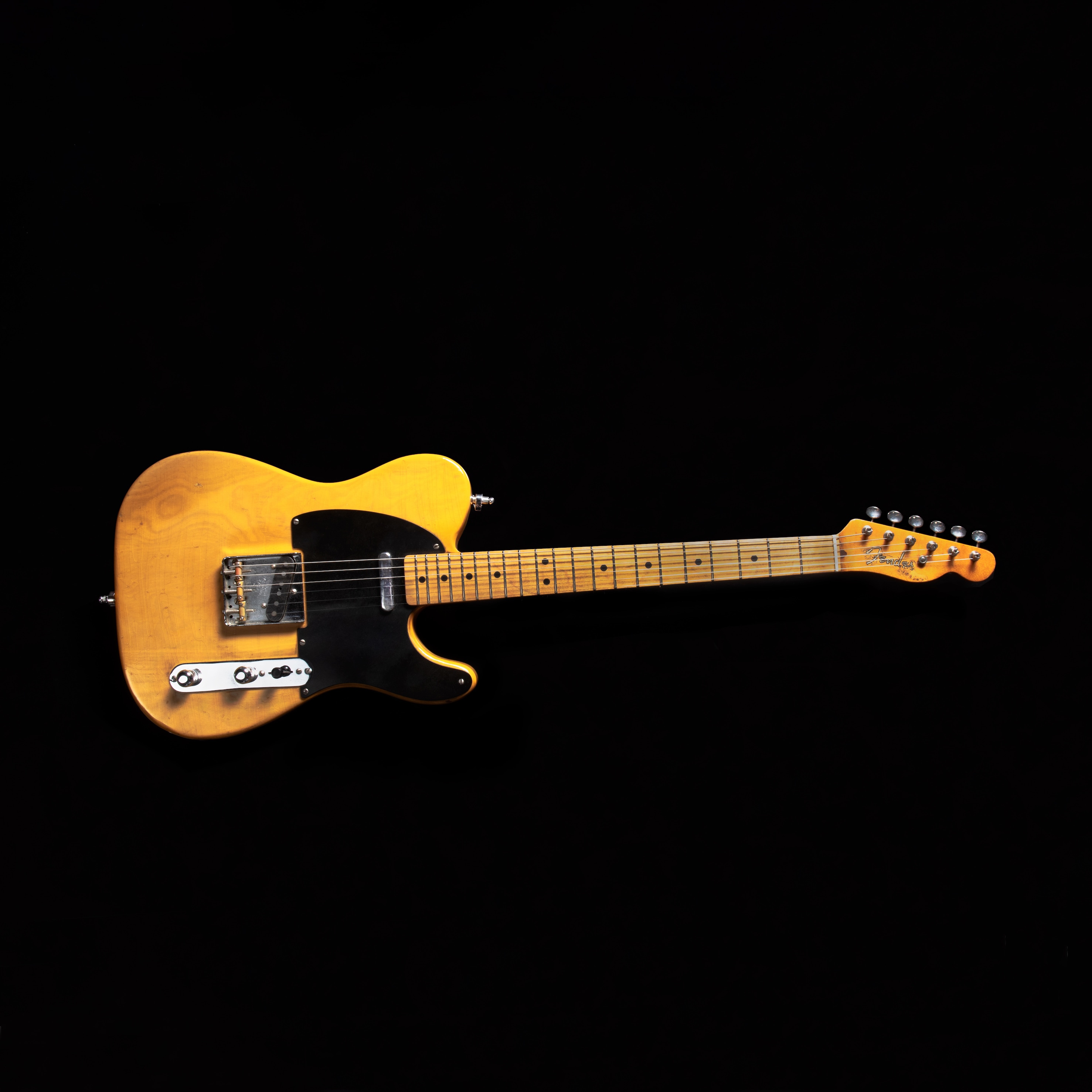
Use the Zoom feature to examine the details of Lorraine Segato's 1952 Fender Telecaster guitar. One of her prized possessions while playing with the Parachute Club, the guitar was a reissued replica of the 1952 Fender Telecaster, the first commercially successful solid-body electric guitar, and the model for guitars beloved by musicians from The Rolling Stones' Keith Richards to Led Zepplin's Jimmy Page.
Courtesy of the Canadian Museum of History/Vincent Lafond
Listen: Boy's Club
Many of the songs on the Parachute Club’s debut album, The Parachute Club (1983), echoed the themes of “Rise Up” and were socially conscious. They confronted issues like gender equality, as heard in their song "Boy’s Club", released in 1984.
This online exhibition uses third-party applications including Spotify and YouTube. Check with your organization’s web administrator if you are unable to access content from these channels in the exhibition.
Watch: The JUNOs
Continuing their success, the Parachute Club recorded additional albums including At the Feet by the Moon (1984), Moving through the Moonlight (1985), and Small Victories (1986).
The band also continued to win awards: taking home the JUNO Award for Group of the Year in 1985 and the 1986 JUNO Award for Best Video for ‘Love is Fire.”
This online exhibition uses third-party applications including Spotify and YouTube. Check with your organization’s web administrator if you are unable to access content from these channels in the exhibition.

Watch Lorraine Segato and music video director Ron Berti accept the 1986 JUNO Award for Best Video for "Love is Fire". Segato and Berti appear on screen at 1:19 to accept their award. Courtesy of RetroTY: The Pulse of Nostalgia. Please note: this third-party video does not provide closed captions.
View TranscriptThe JUNO for the best video of the year, two of Canada's top vijay's from MusiquePlus, Sonya Benezra and.
Allow me, Howie.
Wait Wait.
[Laughter]
Seriously?
Yeah sure.
From CBC's...
Wait a minute.
Stu Jeffries
[Music and Applause]
go ahead speak French I'm ready for you
this year okay okay but can I say goodnight.
00:35
Sure, go ahead.
00:38
Bon soir, tout le monde. Bon soir Stu, comme ce va?
Très, très bien, Sonia. Et vous?
00:42
Wow. Merci, Bravo Stu.
Thanks a lot.
00:45
Go ahead Stu.
00:51
I knew that. Ladies and gentlemen the combining of
00:59
visual images with music isn't a new
01:01
idea. It's just never been done better
01:03
than it has been today. Music videos
01:06
continue to play an important role in
01:07
our industry and tonight we are honored
01:10
to honor the directors who bring this
01:12
extra dimension to our appreciation of
01:14
music. The nominees for best video of the
01:17
year are:
01:24
"Love is Fire". The Parachute Club. Director Ron Berti.
01:37
"Waiting for a Miracle". Bruce Cockburn. Director Ron Berti.
01:55
"Only You" M + M, Directors Mark Gane & Martha Johnson.
02:05
"I'm An Adult Now". The Pursuit of Happiness. Director Nelu Ghiran.
02:22
"Should I See?" Frozen Ghost. Director Stephen Surjik.
02:39
"Easy To Tame " Kim Mitchell. Director Rob Quartly.
02:49
And this year's Juno for best video goes
02:52
to the Parachute Club. Director Ron Berti. Love is Fire.
03:17
this is great now on behalf of my
03:20
partners at total eclipse Derek
03:22
Zoolander Rosen I'd like to thank our
03:25
staff especially Steve Montgomery and
03:27
Deb mckendree I'd like to thank the
03:29
people at Current Records our crew a
03:32
special thanks to our editor Wendy
03:34
Vincent along with the staff at the
03:36
editors and I'd like to thank Parachute
03:40
Club John Oates and especially Lorraine
03:42
for recognizing when the process of
03:46
something can be as rewarding and
03:47
fulfilling as a product thank you for
03:55
the first time in my life I have very
03:57
few words to say except for to them
03:59
thank the members of the Parachute Club
04:02
here Margo Dave Laurie Julie Rebecca
04:06
Billy everyone past and present and this
04:10
for me and the ability to work with a
04:13
guy like Ron is a vote for the future I
04:16
thank you all and thats final thanks to
04:21
bala and ridge
04:23
I for pink bubbliness and hope you get
04:25
well from all your friends thank you.
The End of The 'Chutes
During the late 1980s, the number of band members grew. By the time of the Parachute Club’s final performance as a band in 1988, over a dozen musicians were part of the group. The group split that year to allow its members to pursue individual projects. Lorraine Segato toured as a solo artist and formed the band Big Jump.
Other former Parachute Club members, such as Billy Bryans, focused on producing music and performing as accompanist to other notable Canadian acts, such as Lillian Allen, Buffy Sainte-Marie, and others.
Jack Layton
Many of the Parachute Club members were friends with Canadian politicians Olivia Chow and Jack Layton and happily played at their wedding in 1988. In 2003, when Layton ran for Leader of the New Democratic Party (NDP), he asked permission to use Parachute's Club song "Rise Up" as part of his campaign materials.
Instead, Segato and fellow songwriter Lynne Fernie wrote him a new campaign song, "Bringing All the Voices Together", which many considered to be the unofficial sequel to "Rise Up."
After Layton’s sudden death from cancer in 2011, Lorraine Segato performed a live version of "Rise Up" at his Toronto funeral along with Steven Page (formerly of the Barenaked Ladies) and k.d. Lang.
Over 1300 people passed through Toronto City Hall as part of the funeral program. Hundreds of messages of condolence for Layton’s family and friends were written in chalk in Nathan Phillips Square in front of Toronto City Hall.
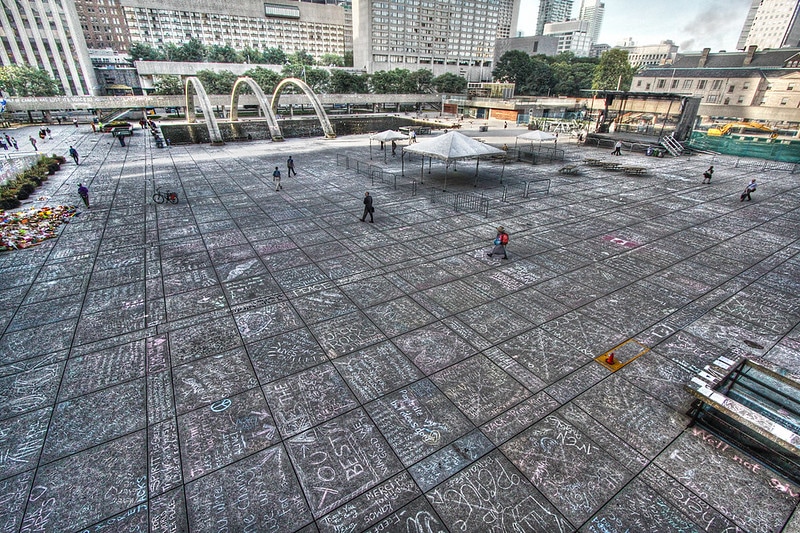
Hundreds of messages in chalk filled Nathan Phillips Square after Jack Layton's funeral in 2011.
Photo by Jackman Chu; Licensed via Creative Commons
Segato Today
Today, Segato continues to work towards advocacy, music, and cultural equity. In 2016, she created the documentary Lowdown Tracks about homeless musicians in Toronto, addressing the city’s affordable housing crisis. Segato continues to remain active in Toronto's music scene. In 2019, Lorraine began teaching a course at Olivia's Chow's Institution of Leaders to help young artists.
Also in 2019, Segato participated in a new recording of “Rise Up”, which also featured both other former Parachute Club band members as well as new young artists, collectively known as the New Parachute Collective. The new single helps to raise money for the Canadian “RiseUp Share Your Power Initiative” that cultivates collaborative artistic activist projects designed to encourage youth leaders to work with established artists.
Watch: The New Parachute Collective
Watch Lorraine Segato reunite with her former bandmate Julie Masi in a new recording of their hit anthem “Rise Up” in support of the RiseUp Share Your Power Initiative.
This online exhibition uses third-party applications including Spotify and YouTube. Check with your organization’s web administrator if you are unable to access content from these channels in the exhibition.

Courtesy of Warner Music Canada. Please note: this third-party video does not provide closed captions.
View Transcript♪Rise up, rise up
Oh, rise and share your power
Rise up, rise up
We're dancing to the sun
Rise up, rise up
In clear-eyed celebration
Rise up, rise up
The spirit's time has come
We want loving, want laughter again
We want heartbeat, want madness to end
We want dancing, want to run in the streets
We want freedom to live in its peace
We want power, want to make it okay
Want to be singing at the end of the day
Children to breathe a new light
We want freedom to love who we please
Rise up, rise up
Oh, rise and share your power
Rise up, rise up
Everybody's dancing to the sun
Rise up, rise up
It's time for celebration
Rise up, rise up
The spirit's time has come
Talking 'bout the right time to be working for peace
Wanting all the tensions in the world to ease
We want to love, run wild in the streets
We want to be free, we want to be free
Talking about a new way, talking about changing our names
Talking about building a land of our dreams
This tightrope's got to learn how to bend
Makin' new plans, we're gonna start it again
Rise up, rise up
Oh, rise and share your power
Rise up, rise up
Everybody's dancing to the sun
Rise up, rise up
In clear-eyed celebration
Rise up, rise up
The spirit's time has come
Rise up now
It's time, it's time, it's time
Rise up, rise up
Oh, rise and share your power
Rise up, rise up
We're dancing to the sun
Rise up, rise up
It's time for celebration
Rise up, rise up
Everybody's time has come
Spirit's time has come
Spirit's time has come
Rise up, rise up
Oh, rise and share your power
Rise up, rise up
Oh, dancing to the sun
Rise up, rise up
It's time for celebration
Rise up, rise up
The spirit's time has come
Woman's time has come
Spirit's time has come♪
Dive Deeper
Official Website of Lorraine Segato
Rise Up: Canadian Pop Music in the 1980s. Documentary. Directed by Gary McGroarty. 2009.

